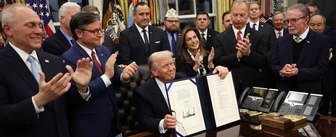Corporate reaction to the passage of new voting regulations in Georgia, including Major League Baseball’s relocation of this year’s All-Star Game and statements of opposition to the law by Delta Airlines, Coca-Cola and other companies, have led to a re-examination of the role of business in politics.
Senate Minority Leader Mitch McConnell at first criticized corporate political actions, then later reconsidered, allowing for corporate involvement, while still criticizing the response to the Georgia legislation. The public in the latest Economist/YouGov poll generally agrees that American businesses should not lobby the government for certain legislation.
Americans express the strongest opposition to corporate money in politics. Nearly two in three (64%) believe businesses should not donate money directly to political candidates. About one in five (17%) say this is something they should do.
Americans also reject business lobbying. By 47% to 29%, they think businesses should not lobby for corporate tax cuts, and by 42% to 29% should not lobby to reduce corporate regulations.
Republicans are not much different from Democrats on the question of corporations donating money directly to political candidates: 61% of Democrats and 71% of Republicans say businesses should not be allowed to donate to candidates.
Many Americans believe businesses should take positions that reflect their own personal political views, so the responses to specific questions often differ by political party. When asked whether or not companies should support various organizations, Democrats would like them to support civil rights (68%) and voting rights groups (63%). Three in five Republicans oppose corporate support for both of these groups.
Democrats also overwhelmingly want companies to support civil rights organizations (77%), voting rights organizations (76%), LGBTQ rights organizations (65%).
Republicans are more willing than Democrats to support business activity in favor of groups that Republicans agree with; for example, gun rights organizations (39%), though nearly half of Republicans (47%) reject that support. Both Democrats (50%) and Republicans (47%) tend to favor business support for religious freedom organizations.
Similarly, when it comes to moving conferences and events from states because of the laws those states have passed, Democrats lean one way and Republicans the other. The end result of these questions is an almost evenly divided country: Democrats support businesses leaving states with laws that discriminate against LGBTQ people (60%) or restrict voting (64%), and just one in five Republicans (18%) approve on each question.
See the toplines and crosstabs from this Economist/YouGov poll
Related: Americans support decision to withdraw US forces from Afghanistan
Methodology: The Economist survey was conducted by YouGov using a nationally representative sample of 1,500 US Adult Citizens interviewed online between April 17 - 20, 2021. This sample was weighted according to gender, age, race, and education based on the American Community Survey, conducted by the US Bureau of the Census, as well as 2016 Presidential vote, registration status, geographic region, and news interest. Respondents were selected from YouGov’s opt-in panel to be representative of all US citizens. The margin of error is approximately 2.7% for the overall sample
Image: Photo by August de Richelieu from Pexels








